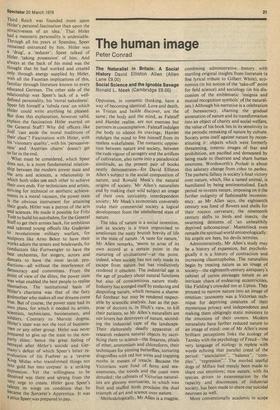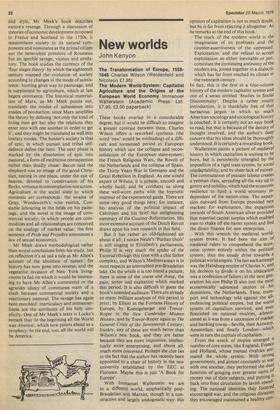The human image
Peter Conrad
The Naturalist in Britain: A Social History David Elliston Allen (Allen Lane £9.00) Social Science and the ignoble Savage Ronald L. Meek (Cambridge £6.00) Opposites, in romantic thinking, have a way of becoming identical. Love and death, as Tristan and lsolde discover, are the same; the body and the mind, as Falstaff and Hamlet realise, are not enemies but partners in contemplation : Falstaff indulges the body to silence its cravings; Hamlet indulges the mind to free himself from its restless wakefulness. The romantic opposition between nature and society, between the rude vigour of savagery and the artifices of cultivation, also turns into a paradoxical similitude, as the present pair of books neatly demonstrates—for David Elliston Allen's subject is the social composition of nature, and Ronald Meek's the natural origins of society. Mr Allen's naturalists end by making their wild subject an image of their own intricately interdependent society; Mr Meek's economists conversely make their commercial society a logical development from the unsheltered state of nature.
The idea of nature is a social invention, just as society is a truce improvised to ameliorate the nasty brutish brevity of life in the state of nature. 'A taste for nature,' Mr Allen remarks, 'seems to arise of its own accord at a certain point in the maturing of civilisations'—at the point, indeed, when society has not only made its escape from nature but has vindictively rendered it obsolete. The industrial age is the age of prudery about natural functions but also of conscientious nature study. Industry has avenged itself by enslaving and despoiling nature, which remains a shameful forebear but may be rendered respectable by scientific analysis. Just as the purpose of doctors is, in Illich's view, to kill their patients, so Mr Allen's naturalists are not lovers but destroyers of nature, seconding the industrial rape of the landscape. Their elaborately deadly apparatus of research redeems natural objects by sacrificing them to science—the firearms, phials of ether, ammonium and chloroform, their techniques for pinning butterflies, torturing dragonflies with red hot wires and trapping moths in messes of treacle. Because the Victorians were fond of ferns and seaanemones, the woods and the coast were denuded; the cabinets of Victorian naturalists are gloomy mortuaries, in which wax fruit and stuffed birds proclaim the dual triumph of art and science over nature.
Methodologically, Mr Allen is a magpie.
combining administrative history with startling original insights from literature (a fine lyrical tribute to Gilbert White), economics (in his notion of the 'take-off' point for field science) and sociology (in his discussion of the emblematic 'insignia and mutual recognition symbols' of the naturalists.) Although his narrative is a celebration of bureaucracy, charting the gradual annexation of nature and its transformation into an object of charity and social welfare, the value of his book lies in its sensitivity to the periodic remaking of nature by culture. Society arms itself against nature by reconstituting it: objects which were formerly threatening, totemic images of fear and prohibition, are pacified and demeaned by being made to illustrate and share human emotions. Wordsworth's Prelude is about this salutary change from ethos to pathos. The pathetic fallacy is society's final victory over nature, which, like a tamed animal, is humiliated by being sentimentalised. Each period re-invents nature, imposing on it the further indignity of fashionable inconsistency: as Mr Allen says, the eighteenth century was fond of flowers and shells for their rococo curvature; the nineteenth century shifts to birds and insects, the swarming denizens of 'an unhealthily deprived subconscious'. Maeterlinck even remade the spiritual world entomologically: his angels are bees, his devils termites.
Administratively, Mr Allen's study may be a history of expansion, but psychologically it is a history of contraction and increasing claustrophobia. The naturalists begin by treating nature as an image of society—the eighteenth-century antiquary's cabinet of curios envisages nature as an intricate chaos of endearing eccentricities, like Fielding's crowded inn at Upton. They proceed to narrow nature into an image of emotion: taxonomy was a Victorian technique for depriving creatures of their mysterious privacy and independence and making them obligingly static ministers to the emotions of their owners. Modern naturalists have further reduced nature to an image of mind: one of Mr Allen's most brilliant perceptions links the ecology of Tansley with the psychology of Freud—`the very language of ecology is replete with words echoing that parallel creed of the period: "association", "balance", "complex", "regression".' The morbid tearful dogs of Millais had merely been made to share our emotions; now nature, with its species driven to extermination by the rapacity and discontents of industrial society, has been made to share our suicidal neuroses as well.
More conventionally academic in scope
and style, Mr Meek's book describes nature's revenge. Through a discussion of theories of economic development proposed in France and Scotland in the 1750s, it reassimilates society to its natural components and nominates as the primal citizen not the benevolent primitive of Rousseau but an ignoble savage, vicious and predatory. The book studies the currency of the 'four stages theory' by which the eighteenth century mapped the evolution of society according to changes in the mode of subsistence: hunting gives way to pasturage, and is supplanted by agriculture, which at last begets commerce. The historical materialism of Marx, as Mr Meek points out, translates the modes of subsistence into modes of production, since Marx amplifies the theory by defining 'not only the kind of living men get but also the relations they enter into with one another in order to get it', and they might be translated as well into literary modes. The hunter's society is that of epic, in which pursuit and tribal selfdefence define the hero. The next phase is marked by the dissolution of epic into pastoral, a form of meditative retrospection rather than deadly chase: Bacon said the shepherd was an image of the good Christian, resting in one place, under the eye of heaven, devoted to conservation of his flocks, virtuous in contemplation not action. Agriculture is the social state to which romantic art corresponds: the swains of Gray, Wordsworth's wise rustics, Constable labouring in the fields on his paintings; and the novel is the image of commercial society, in which people are commodities and all relationships are conceived on the analogy of market value: the first sentence of Pride and Prejudice announces a law of sexual economics.
Mr Meek draws methodological rather than moral conclusions from his study, but on reflection it's as sad a tale as Mr Allen's account of the abolition of nature: for history has now gone into reverse, and the vegetative invasion of New York livingrooms (a fad on which it would be interesting to have Mr Allen's comments) or the agrarian idiocy of communes warn of a clash between commercial society and a reactionary pastoral. The savage has again been ennobled: inarticulacy and unmannerliness are the attributes of his holy simplicity. One of Mr Meek's texts is Locke's remark that 'in the beginning all the World was America', which now points ahead as a prophecy. In the end, too, all the world will be America.



































 Previous page
Previous page